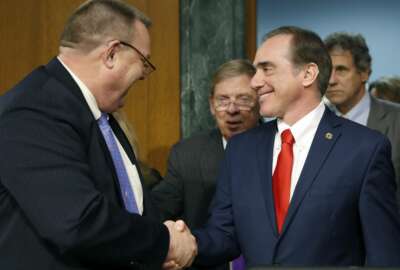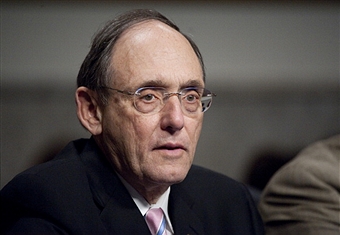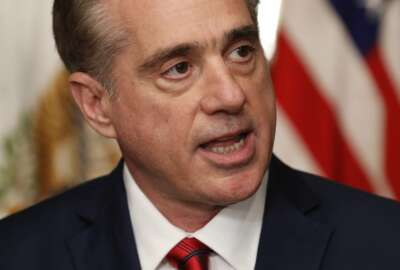
Federal employee groups say Senate VA bill does little to tackle entrenched accountability problems
The Veterans Affairs Accountability and Whistleblower Protection Act, which senators introduced last week, may have more momentum than previous bills. It now has 12...
Frustration over accountability procedures at the Veterans Affairs Department has been brewing in Congress since 2014, when lawmakers heard about wait time scandals at the agency and demanded visible action from VA.
But after three years and multiple attempts at changing current accountability legislation that VA later said wasn’t meeting its needs, frustration with Congress and the department seems to be at the boiling point.
Yet the Veterans Affairs Accountability and Whistleblower Protection Act, which senators introduced last week, may have more momentum than previous bills. It now has 14 co-sponsors, including four Democrats. Ranking members on both the House and Senate Veterans Affairs Committees have expressed at least general support, and Senate committee Ranking Member Jon Tester (D-Mont.) is an original co-sponsor.
Senate VA Committee Chairman Johnny Iskason (R-Ga.) touted messages of support from several veterans services and military organizations, and the bill received backing from Special Counsel Carolyn Lerner.
The bill also has support from VA Secretary David Shulkin himself, who said he doesn’t see the legislation as a tool for him to fire employees “willy-nilly.”
“We’re talking here about a very, very small number of employees who have deviated and drifted away from the ethic[s] and the responsibilities that they took on to serve our country’s veterans and no longer should have the privilege of serving in our system,” Shulkin said, during a May 11 Senate Appropriations Military Construction and Veterans Affairs Subcommittee hearing. “In those cases, I wish it wasn’t true, I wish today I could tell you I had the tools to do the right thing and to be able to remove those employees. I do not. So unfortunately, I need a new set of tools.”
That momentum may carry the bill more quickly through the Senate. The Senate Veterans Affairs Committee will hold a legislative hearing on the bill May 16. It wants to see the bill on the floor for a vote next month.
The House already passed its own version, the VA Accountability First Act, in March. Many provisions from the House version made it in to this Senate bill.
Yet federal employee groups and experts say the legislation provides only superficial and cosmetic adjustments to accountability procedures that have deeper, more entrenched cultural challenges.
“Legislation and new bureaucracy cannot change organizational culture,” Senior Executives Association President Bill Valdez said in a statement to Federal News Radio. “It is unclear why Congress and the VA need to reinvent the wheel for addressing employee misconduct and performance when existing law is effectively used by other federal agencies.”
A faster appeals and removal process may or may not get poor performers out the door more quickly, but it will do little to shift VA’s organizational culture.
“Changing the procedure does not guarantee that the results will be achieved,” Bob Tobias, a professor at American University’s Key Executive Leadership Programs, said during an interview on the Federal Drive with Tom Temin. “So making things shorter, making it more difficult does not guarantee that more people who are poor performers will be discharged, or more people who should be discharged based on conduct will be discharged.”
A faster appeals process will do little to incentivize VA managers to manage conflict more effectively and feel comfortable dealing with legitimate poor performers, Tobias said.
“It’s because of a failure of a supervisor’s boss or boss’ boss who won’t support a discharge. It’s a lawyer who is too busy and says, ‘Settle the case,'” he said. “It’s an agency that has a culture of tolerating poor performers and moving them around from one division to another, and those issues will not be met by a change in the process for discharge.”
Beyond the broader issues some have with the legislation, federal employee groups have more specific complaints.
The American Federation of Government Employees (AFGE), which represents many VA employees, said the 15-day notice, response and decision timeline for disciplinary actions is simply too short.
“Two weeks is not a lot of time to mount a strong defense on a proposed removal, but they don’t want to even give the employee that much time,” AFGE said in an interview.
The Project on Government Oversight (POGO) agreed. Though it applauded many of the whistleblower protection provisions in the bill, it’s concerned by some of the civil service protections that may disappear, which POGO has seen benefit whistleblowers too.
Both VA employees and senior executives would have seven days to respond to a notice of a proposed removal.
“It’s just too short to be a reasonable amount of time for someone to respond to a notice like that,” said Elizabeth Hempowicz, policy counsel at the Project on Government Oversight (POGO).
In addition, VA would have to show substantial evidence that an employee or senior executive committed misconduct or performed poorly, according to the legislation. The agency typically has less to prove under the “substantial evidence” standard compared to the current preponderance standard.
More Oversight News
AFGE also took issue with this change, arguing that the department would have to prove less in order to make a disciplinary action.
Yet Shulkin said the current preponderance standard of evidence puts too many delays on the disciplinary process.
“Substantial evidence … allows the court to interpret the rulings in a way that is differential to the secretary, to the business,” Shulkin said last week. “We have to prove that it’s in the agency’s interest to be able to make a disciplinary action, where if we want to have a preponderant standard, that would be mathematical. You’d have to show that 51 percent of the evidence is in favor of a disciplinary action. That would be a much longer process.”
The bill would also eliminate the Merit Systems Protection Board as an avenue for senior executives to appeal a disciplinary action.
VA and some members of Congress have been frustrated with the MSPB, which overturned three punishments for senior executives in the department last year, and long advocated for a peer review process for SES disciplinary appeals over MSPB.
Senior executives could still appeal their cases to the Federal Court of Appeals, but SEA said MSPB was created for a reason.
“Congress in its wisdom when it passed the [Civil Service Reform Act] of 1978 set up the quasi-judicial MSPB to keep federal personnel cases out of federal courts and in the hands of subject matter experts, who … over its entire history has an average affirmation rate of agency decisions of 85 percent of the time,” Valdez said.
Some controversial provisions that appeared in previous bills, however, are absent from the VA Accountability and Whistleblower Protection Act.
This legislation, for example, doesn’t include a blanket freeze on bonuses and awards for senior executives, which other bills have suggested in the past.
Yet some federal employee groups fear this kind of legislation could set a precedent for changes at other agencies.
“This is an attempt to overturn 140 years of civil service law, the basic principles of the civil service system,” AFGE said.
Whistleblower protections
The bill also creates an Office of Accountability and Whistleblower Protection at the department. The president will appoint an assistant secretary to lead this office, who will report directly to the VA secretary.
The accountability and whistleblower protection assistant secretary will receive whistleblower disclosures, maintain a toll-free hotline and website to receive anonymous complaints and then analyze data from those sources and report to the secretary and Congress on the trends it sees.
“That [report] not only goes through how they responded to individual whistleblowing cases and how the procedures internally in the office are working but that’s [also] required to look as a whole and aggregate and track whether whistleblower disclosures are showing trends in these offices,” said Hempowicz, who applauded the reporting requirements in the bill related to VA’s whistleblower activities.
This bill also gives the office and its leader more independence than previous laws and attempts at VA whistleblower legislation, Hempowicz said.
And though it has the same name as the office President Donald Trump created in the executive order he signed a few weeks ago, POGO believes this Office of Accountability and Whistleblower Protection included in the Senate bill is stronger.
The legislation doesn’t detail how the department plans to punish or hold supervisors and managers accountable for protecting whistleblower disclosures. POGO said it would like to see more specificity but generally favored the provision that sets whistleblower protection as a criteria in supervisors’ performance plans.
Copyright © 2025 Federal News Network. All rights reserved. This website is not intended for users located within the European Economic Area.
Nicole Ogrysko is a reporter for Federal News Network focusing on the federal workforce and federal pay and benefits.
Follow @nogryskoWFED






